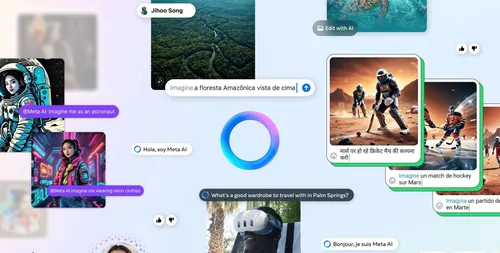Meta accusata di addestrare l'IA utilizzando contenuti pirati da torren

A new day, another controversy surrounding artificial intelligence. This time, Meta was accused of using pirated content from torrents to train its large language model (LLM) Llama, which powers Meta AI. The case was one of the first copyright lawsuits filed against a technology company for training AI.
The documents reveal that Meta AI was trained with pirated content.
As reported by Wired, Meta was forced to sue in 2023 for having accosted Llama, its LLM, with pirated content. The case became known as "Kadrey et al. v. Meta Platforms" and was brought by narrators Richard Kadrey and Christopher Golden, who claimed that Meta had used copyrighted material without authorization.
So far, Meta had submitted censored documents to the court. However, Judge Vince Chhabria of the United States District Court for the Northern District of California ordered that the original documents be made public – and they were.
The documents reveal conversations between Meta employees regarding Meta AI and Llama. In one of the conversations, an engineer states that "downloading from a [Meta] company computer doesn't make sense," confirming that the company used pirated content to train its AI. Another conversation suggests that "MZ" (Mark Zuckerberg) authorized the use of pirated materials.
The discovery suggests that Meta used content from LibGen, a large library of books, journals, and academic articles. LibGen was created in Russia in 2008 and has faced many legal actions to defend copyright holders subsequently, although no one knows who actually operates the 'piracy hub'. Meta also stated that it used content from other 'hidden libraries' for AI training.
The company claims to have used public materials under the legal doctrine of "fair use," which allows the use of copyrighted material without permission in certain circumstances, analyzed on a case-by-case basis. Meta also states that it is simply "using text to statistically model language and generate original expressions."
- Meta announces the extension of its AI functionalities to an additional 21 countries.

This is not the first time that major technologies have been accused of training AI models with copyrighted content. Last year, an investigation discovered that the Apple-created OpenELM model included subtitles from over 170,000 YouTube videos.
Although at first this led to the belief that Apple was using copyrighted content to train Apple Intelligence, the company then explained that OpenELM is an open-source model created for research purposes and that its database is not used to power Apple Intelligence.
According to Apple, its AI features available on iOS and macOS are trained "on licensed data, including data selected to improve specific functionalities, as well as publicly available data collected by our web-crawler.
It's important to note that many major publishers like The New York Times and The Atlantic have chosen not to share their content for the training of Apple Intelligence.
- Buy new Apple products at a discount
Categorie
Ultimi articoli
- Recensione della tastiera meccanica Satechi Keyboard SM3: silenziosa e perfetta per la produttività.
- Questo vecchio telefono si è trasformato in un pericolo di incendio davanti ai miei occhi.
- 10 modi in cui l'app Invitations di Apple differisce da Calendar di Apple
- Apple al lavoro: Il 2025 sarà l'anno in cui Apple rilascerà un concorrente di Google Workspace?
- È improbabile che Apple organizzi un evento speciale per annunciare l'iPhone SE 4.
- Suggerimenti e soluzioni per le connessioni di oggi del NYT dell'8 febbraio (#608)
- Il supporto per Ubuntu 20.04 LTS sta per concludersi.
- Hai un ritardo nella lettura? Lascia che l'IA ti legga ad alta voce.
- Questo è il mio lettore Blu-ray del Santo Graal.
- Nuove produzioni Apple saranno rilasciate la prossima settimana, ecco cosa arriverà.
Tag più recenti
- silenziosa
- meccanica
- smaltimento
- litio
- gonfie
- differenze
- Apple Calendar
- e-mail aziendale
- Google Workspace
- Connessione



